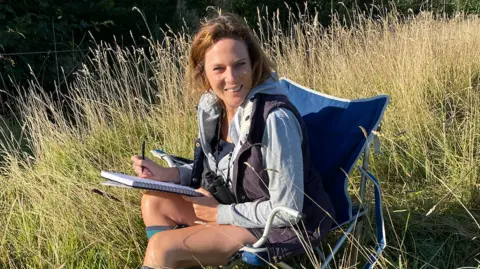First beaver born in Lincolnshire in 400 years
A baby beaver has been born in Lincolnshire for the first time in 400 years.
A kit was spotted on CCTV on 13 June at an enclosure in North Lincolnshire- making it the first born in the county since they went extinct in Britain in the 16th Century.
In December 2023, two Eurasian beavers were released under licence into a 70-acre enclosure at Wild Wrendale, near Searby, as part of a rewilding project by farmers Hannah and Jack Dale.
Ms Dale, 43, said it marked an important milestone in the return of the species: "Beavers belong in our landscape."
 Hannah Dale
Hannah DaleIn 2019, the couple had their last harvest and soon made the decision to dedicate their unproductive farm to nature restoration.
With support from the Beaver Trust and other wildlife organisations, in 2023 the pair released two beavers.
Two years later, Ms Dale said it was a "lovely surprise" to see footage of a kit scurrying past one of her cameras.
It confirmed their mission to encourage the species had worked.
Although only one was spotted on camera, Ms Dale said it was likely there were more, as beavers tend to have two to four kits per litter.
"It's really exciting that the first baby beavers have been born in Lincolnshire for about 400 years," Ms Dale said.
'They belong here'
Ms Dale said she believed beavers offered far more than just a cute face.
"They're a really good tool to have in our armoury for becoming more resilient in the fight against climate change," she said.
According to Ms Dale, when beavers were present in the landscape during storm events, their way of life was able to reduce flood pressure.
"During periods of drought they can hold the water back on land," she said.
Ms Dale said the species are vital and said she was proud to play a small part of their return to Lincolnshire.
"There is absolutely a lace for them in the countryside and the landscape," she said.
"They belong here."
